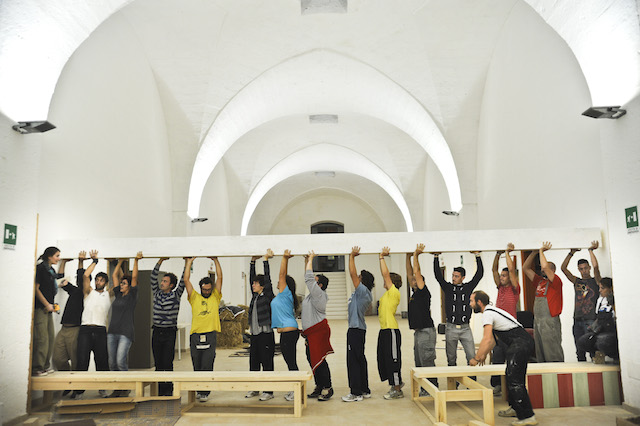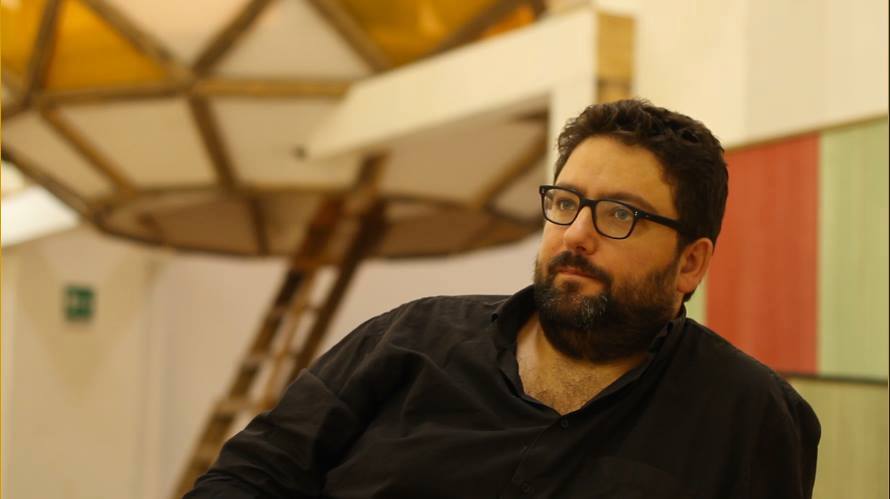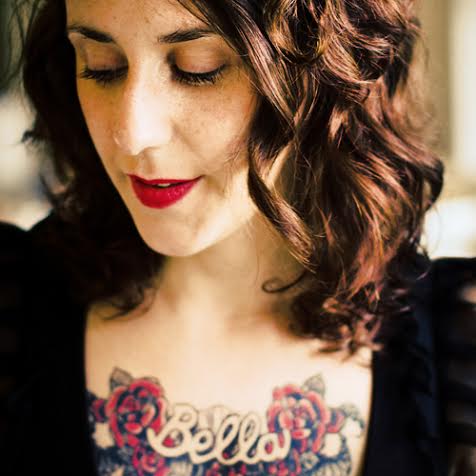Roberto Covolo, ExFadda’s project manager. Article co-authored with Nicole Stojanovska.
Jutting into the Mediterranean on the stiletto heel of Italy, the municipality of San Vito dei Normanni in Puglia is home to 20,000 Sanvitesi inhabitants. The Apulian countryside is peppered with olive groves, oak trees, and farms separated by wind-polished stone walls. Agriculture has long been the backbone of the local economy, but a lack of employment and social innovation has compelled a large portion of the town’s youth to emigrate.
This lesser-known stretch of Apulian terrain seems an unlikely setting for a social innovation hub, but it is in ExFadda, a once-abandoned structure of San Vito, where an inactive space has become a center of community life. Its influence has ensured that modern design now has a strong presence in the town: from its grand central hall that has become community meeting point reminiscent of a modern-day temple, to the clever use of recycled furniture, to the more recent launch of XFood, a beautiful diversity-themed restaurant run exclusively by disabled staff. ExFadda’s approach demonstrates in the most poignant, tangible way that all community members have something to offer.
This response to a struggling economy and resident out-migration was made possible by a team of committed design strategists, including Roberto Covolo. In the face of scarce resources and a lack of community spirit, the vision for a living, public space based on openness, trust, collaboration, and civic pride lies at the heart of ExFadda.
Through co-creation of a physical space, ExFadda built a flourishing community and gave local youth a legacy to uphold. In this southern corner of Italy, disconnected from the wealth in Northern Italy and overshadowed by the appeal of popular nearby tourist destinations, the reality of economic isolation is tangible. There is much to be learned from the ExFadda approach to reclaiming power in the face of challenges by putting the power of community and economic growth in the hands of each and every resident.
I recently corresponded by e-mail with ExFadda’s inspirational project manager, Roberto Covolo, to learn the secrets of ExFadda’s winning formula.
A normal day in ExFadda. Photo credit: XFOTO
What is ExFadda?
ExFadda began as an experiment tied not only to the development of property, but with a focus on the development of a community of people. The idea was for them to keep and maintain the property and share their resources with a common goal of creating value for themselves and their territory. What we set up with ExFadda is not a project; it’s not a product, but rather a process.
We wanted to instill a new sense of civic responsibility in San Vito and facilitate an active community by focusing on the development of communal areas. We pushed for the creation of a public space to be built through public activity as opposed to passively watching development unfold. It was paramount to create a new place where citizens could not only feel like consumers, but rather active contributors; people who supply content and value.
In 2006, the region of Puglia published the "Urban Laboratory" in order to push the municipalities to find solutions for the use of abandoned public buildings for cultural and social activities. The town of San Vito dei Normanni pitched a project for the conversion of its former wine factory, "Dentex Frasso" called "Fadda" (named after Admiral Renato Fadda, the wine factory’s last manager). It was a monument of industrial archeology and architectural value which boasted a massive 4,000 square meter section of a park as big as two football fields.
Made public property after productive activity began in the early 20th century, the complex was gradually abandoned and the repository of resources became an idle vessel. It remained closed for over 50 long years.
In 2008, the municipality announced a call for the assignment of the space’s management which was answered by and granted to a consortium made up of local leader group Sunday SRL and five cultural and social territorial associations.
With a contribution of instrumental economic resources sourced through crowdfunding, partnerships, donations, and recovery of discharged materials, the former Fadda was able to once again open its doors.
Since then, thousands of people have been involved with the space and participated in events and activities. The property has spawned a stream of ventures: a restaurant, a café, a shared garden, a space to host live events, and sporting and cultural venues.
What are ExFadda's values?
ExFadda is based on the values of trust, collaboration, and co-operation.

The ExFadda community lifts one of the main beams during ExFadda's restoration.
What impact are you having on your town, San Vito dei Normanni?
ExFadda is a community project based on the involvement of citizens, especially citizens that are active and who aspire to turn an idea into a concrete project. After five years of work, ExFadda has become a communal hub: a place to give life to the aspirations of the community and facilitate shared involvement in community matters.
What does restoring a building have to do with building community? And what role did design play?
To us, reviving an abandoned space means creating an active and alert community. Sharing the design and the construction of ExFadda and dividing the area was an essential way to build something greater than just a place, but a community where trust is the main working capital.
Since 2012, ExFadda has launched several participatory planning and self-construction efforts involving architects, designers, and craftsmen as "foremen" of groups of citizens interested in creative rehabilitation of ExFadda’s space.
This construction has allowed for the rebirth of different areas of the space that now house workshops (such as studies, playgrounds, sports halls, exhibition galleries, meeting places, rehearsal rooms, and rooms for expositions) through repurposing and recycling of materials and through exploitation of local artisan knowledge.

Roberto Covolo and Manta — a community craft project that brings together female artisans and young designers.
What was the hardest moment and how did you get through it?
The most difficult issue was the economic investment required to restructure the operations for opening XFood — the first Apulian social restaurant exclusively employing the disabled. We are still resolving the situation through constant hard work and by paying back a bank loan.
What are ExFadda's current projects?
By building relationships of trust with and within member organizations, ExFadda aims to build an active and inter-connected community that is able to respond to a variety of social needs such as educational workshops for young people, development support for new businesses, spaces for various associations, social gatherings for families, meetups for seniors, and platforms for different forms of culture.
Over 4,000 square meters of the structure today hosts more than 30 organizations active in the fields of art, culture, creativity, design, welfare, crafts, sports, and local development. To name a few of them: the World Music Academy (a training and production center for ethnic music), XFOTO (a collective of photographers and videographers), Faddanza (a contemporary dance school), the Manta (a community craft project that brings together artisan women and young designers), the Parkour School, the School of Yoga, and the Music Room (a rehearsal room made out of straw and recycled wood).
How do you foster local participation?
The number one rule is openness. A successful space is "low threshold” meaning it's accessible, easy to get to, pleasant, easily navigable, and open to different forms of use at different times of the day. Another good strategy is making our spaces usable by the others. Having something to do gives people a reason to go to a place and return time and time again. When there is nothing to do in a place, it will remain empty and that usually means that something has gone wrong. The more activities that are on and the more people that have the opportunity to participate, the better.
The daughter of one of the Manta's members weaving during the Yeahyasi Festival.
How important is sharing within the ExFadda community?
It’s important, and it is primarily a matter of trust. If we want people to begin to share, they have to trust us. For that to happen, we must first share our resources: money (when we have it), space (if we save some of it for others), skills, relationships, and networks (with our job we constantly get to know interesting people and organizations; why not share this?). We let others decide what to leave in return. The results can be unexpected.
Do you use alternative economic practices at ExFadda?
Our income statements show that part of our income is based on a trust-based communal economy. Instead of charging a flat rate, we decided upon a voluntary contribution working on the principles of fair self-assessment and shared responsibility. In the future, we would like to deal with the theme of local currencies, creating a complementary currency for San Vito dei Normanni.
How important are relationships for ExFadda value creation?
Very important, indeed! The importance of ExFadda in a local context is related to its ability to improve the human capital on the basis of relationships and to produce social capital through the consolidation of relations, alliances, and networks.

The community garden behind XFOOD restaurant. It uses synergistic agricultural methods that combine new and old ways.
Can we define what you do culturally and why? How much does it have to do with the local culture?
What we do in terms of culture works at several levels. Through our practices and our support for activism, we work to bring cultural change to the big unresolved questions of Southern culture (distrust, disillusionment, social immobility). In addition, we share meaning with the local cultural heritage (for example, the World Music and Dance Academy and Coreutica: a project of international co-operation of artist residency based on the dances and music of the Mediterranean) and with the new languages of creativity (see XFOTO).
What’s the Southern way?
There are some features and peculiarities of our Southern culture that enable our form of small business growth, and a description of these aspects of Southern culture may help those undertaking new projects in a similar vein.
The first aspect is the typical Southerner’s approach of "seeing and doing.” It is similar to the concept of the “lean organization” or the concept of a “permanent beta.” The Southerner’s inclination is to observe things and rapidly respond to changes in context, changing continually to meet the continually changing demands that characterize the real world. This inclination is especially important in the context of scarce resources. Keeping “seeing and doing” in mind will be a positive asset when developing ideas for new business growth.
The second aspect of our culture is the vision of relationships (or relational capital) as the primary benefit of our culture and communities. We need to overturn the paradigm that says only those who know people can do things and, instead, enable all people by connecting everyone and imagining that it’s possible to build organizational structures in which existing social networks (friendly, professional, domestic, and social relationship) can be leveraged in new ways to develop ideas for new business growth.
The third and essential aspect is "the art of getting by" — a trait that is often described in a grotesque way depicting Southern Italy and its inhabitants' approach like making a virtue out of necessity. I believe that is a very contemporary asset and, due to that, the Southerners should have an advantage to deal with the crisis and the complexity of nowadays society.

XFood Restaurant, an eatery that employs disabled staff.
The interior of XFood, the restaurant that you’ve opened in the space, is uniquely beautiful. Tell us about the design.
To describe XFood as one-of-a-kind is both accurate and paradoxical to its central theme. The restaurant uses an eclectic mashup of furniture and crockery salvaged or restored from flea markets to make a statement that transcends design. The space is illuminated by outdoor lights used in Southern culture for occasions of celebration. XFood is a celebration of diversity in itself. It was developed to create employment opportunities for residents of San Vito with disabilities and to promote inclusivity.
How can people be involved in ExFadda?
Come and visit San Vito and ExFadda and have a coffee with us!









